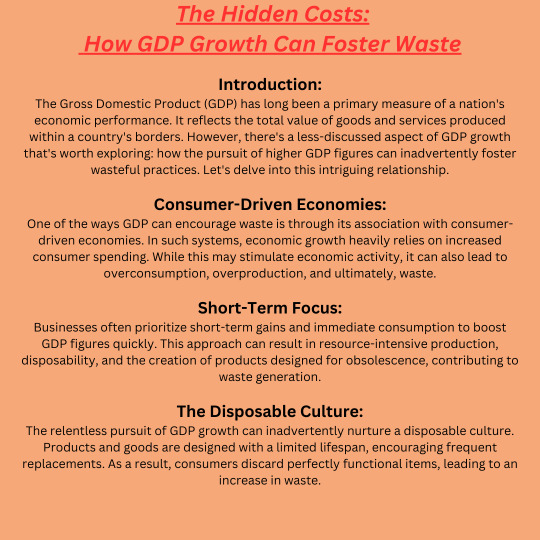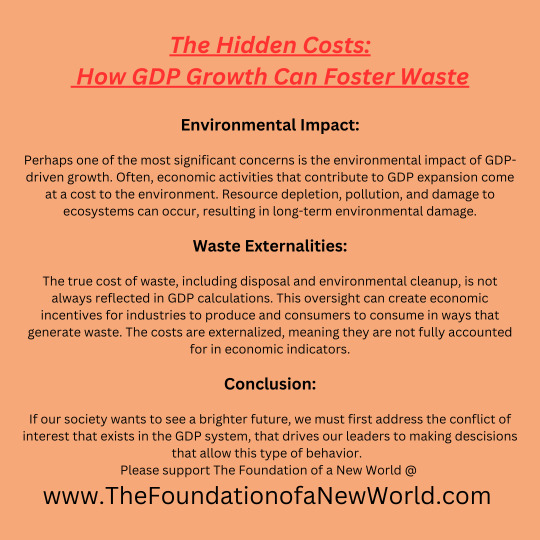Text
A new podcast with The Leila Show
#climate change#climate crisis#climate action#poverty#equity#environment#fair#equality#justice#Spotify
0 notes
Text
The Conflicts of Interest Driving Environmental Destruction
There are conflicts of interests that are driving the destruction of our environment and discouraging our leaders from making the best decisions for our people and our environment. Job Dependency and GDP Dependency are these conflicts of interests and the major problems we must address if we are to do the best job of caring for our planet and ourselves.
Job Dependency is a problem that is rooted in high costs of living and low wages. Because we are a job dependent people, we need to provide job security. The basic problem that arises from this need, is that the concept of designing and manufacturing products to last longer or be more efficient, conflicts with our people's dependence on jobs.
So instead, we produce products designed to fail faster, so they can be replaced, protecting our jobs. This harms the environment every step of the way, from harvesting raw materials, shipping, manufacturing, packaging, distribution, retailing, disposing of packaging, disposing of product, and finally beginning again buying replacement products.
Our leaders who have the ability to curb and prevent such practices, would face the conflict of losing jobs and high unemployment, encouraging them to allow the practice of planned obsolescence.
GDP Dependency has a few conflicts of interests that drive environmental destruction.
1st: The GDP system requires a growth of 2% or more gross domestic product each year for an economy to be considered healthy and not in a recession or depression. This creates the exact same conflict as Job Dependency, discouraging governments from taking action against planned obsolescence and instead being more encouraged to allow or even encourage the action, harming our environment repeatedly as a result.
2nd: The GDP system benefits from high costs of goods. If our government took actions that significantly lowered the cost of housing, healthcare, or goods in general, this could negatively affect the nations GDP, so our government would be encouraged not to take action that would significantly lower the cost of these goods. This of course feeds back into the Job Dependency problem and the environmental impacts that follow.
3rd: The GDP system does not give credit towards a nations GDP for both raw materials and finished products. For example, if fruit was grown, packaged and sold within the nation for $1.00, the nation only receives credit towards their GDP for $1.00 from the final sale. But if one nation sold the fruit for $.10, another packaged the fruit for $.25, and a third sold the final product for $1.00, then you have a total of $1.35 added to all of their countries.
This behavior adds no real value to the original purpose, to have a product, but instead creates an arbitrary gain that matters only to the GDP system itself, driving us to ship more and more product unnecessarily around the world. With the average cargo ship using around 33,000 to 66,000 gallons of fuel per day, this activity causes massive amounts of pollution that is unnecessary and gives us no real gain.
When combined with the GDP's need for 2% or more growth per year, it is reasonable to expect global shipping to increase 20% over the next 10 years and the increased pollution that comes with it.
With these conflicts of interest in mind, we will find an endless problem with wasteful practices that are environmentally destructive being supported or ignored by those with the power to prevent them.
I have designed an economic system that addresses and solves these problems and more, and I am building The Foundation of a New World to build a city for those in need and to prove to the world that this system works. To learn more and support us in this goal, goto www.TheFoundationofaNewWorld.com
2 notes
·
View notes
Text
youtube
A talk about The Foundation of a New World
#climate change#climate crisis#climate action#poverty#equity#environment#fair#equality#justice#typography#Youtube
0 notes
Text
An Interview about The Foundation of a New World on The Backstory with Omobola Stephen
E021: COMMON DENOMINATOR BETWEEN ENVIRONMENTAL DESTRUCTION AND POVERTY EXPLOITATION WITH CHRISTOPHER ELLINGSWORTH - THE BACKSTORY WITH OMOBOLA STEPHEN | Podcast on Spotify
1 note
·
View note
Text

Help support and spread The Foundation of a New World's message today by buying a shirt!!!
Imagine a world where people were free to pursue their passions, instead of being locked to their jobs.
Imagine if we could protect our environment simply by creating products to be the best they can be, instead of creating them to be replaced as soon as they can be.
Help build The Foundation of a New World, and stop imagining.
1 note
·
View note
Text
The Conflicts of Interest Driving Environmental Destruction
There are conflicts of interests that are driving the destruction of our environment and discouraging our leaders from making the best decisions for our people and our environment. Job Dependency and GDP Dependency are these conflicts of interests and the major problems we must address if we are to do the best job of caring for our planet and ourselves.
Job Dependency is a problem that is rooted in high costs of living and low wages. Because we are a job dependent people, we need to provide job security. The basic problem that arises from this need, is that the concept of designing and manufacturing products to last longer or be more efficient, conflicts with our people's dependence on jobs.
So instead, we produce products designed to fail faster, so they can be replaced, protecting our jobs. This harms the environment every step of the way, from harvesting raw materials, shipping, manufacturing, packaging, distribution, retailing, disposing of packaging, disposing of product, and finally beginning again buying replacement products.
Our leaders who have the ability to curb and prevent such practices, would face the conflict of losing jobs and high unemployment, encouraging them to allow the practice of planned obsolescence.
GDP Dependency has a few conflicts of interests that drive environmental destruction.
1st: The GDP system requires a growth of 2% or more gross domestic product each year for an economy to be considered healthy and not in a recession or depression. This creates the exact same conflict as Job Dependency, discouraging governments from taking action against planned obsolescence and instead being more encouraged to allow or even encourage the action, harming our environment repeatedly as a result.
2nd: The GDP system benefits from high costs of goods. If our government took actions that significantly lowered the cost of housing, healthcare, or goods in general, this could negatively affect the nations GDP, so our government would be encouraged not to take action that would significantly lower the cost of these goods. This of course feeds back into the Job Dependency problem and the environmental impacts that follow.
3rd: The GDP system does not give credit towards a nations GDP for both raw materials and finished products. For example, if fruit was grown, packaged and sold within the nation for $1.00, the nation only receives credit towards their GDP for $1.00 from the final sale. But if one nation sold the fruit for $.10, another packaged the fruit for $.25, and a third sold the final product for $1.00, then you have a total of $1.35 added to all of their countries.
This behavior adds no real value to the original purpose, to have a product, but instead creates an arbitrary gain that matters only to the GDP system itself, driving us to ship more and more product unnecessarily around the world. With the average cargo ship using around 33,000 to 66,000 gallons of fuel per day, this activity causes massive amounts of pollution that is unnecessary and gives us no real gain.
When combined with the GDP's need for 2% or more growth per year, it is reasonable to expect global shipping to increase 20% over the next 10 years and the increased pollution that comes with it.
With these conflicts of interest in mind, we will find an endless problem with wasteful practices that are environmentally destructive being supported or ignored by those with the power to prevent them.
I have designed an economic system that addresses and solves these problems and more, and I am building The Foundation of a New World to build a city for those in need and to prove to the world that this system works. To learn more and support us in this goal, goto www.TheFoundationofaNewWorld.com
2 notes
·
View notes
Text
The World Is What You Make It
Some say that world is in a bad state, so they excuse themselves from doing good, as if there is no point because of the bad state of the world.
But the world is not good nor bad, it is simply a place. The state of the world depends on the actions of those who live in it, and the actions and decisions taken by those who live in it.
Every good deed, makes the world around you better, while every bad deed makes the world around you worse.
You can make the world a better place, simply by being better to it, and all within it. Or you can make the world a place of horror and sorrow.
The Choice. Belongs. To You.
2 notes
·
View notes
Text
The World Is What You Make It
Some say that world is in a bad state, so they excuse themselves from doing good, as if there is no point because of the bad state of the world.
But the world is not good nor bad, it is simply a place. The state of the world depends on the actions of those who live in it, and the actions and decisions taken by those who live in it.
Every good deed, makes the world around you better, while every bad deed makes the world around you worse.
You can make the world a better place, simply by being better to it, and all within it. Or you can make the world a place of horror and sorrow.
The Choice. Belongs. To You.
#climate change#climate action#equity#environment#equality#justice#climate crisis#poverty#fair#love#better world#salvation#faith
2 notes
·
View notes
Text

Help support and spread The Foundation of a New World's message today by buying a shirt!!!
Imagine a world where people were free to pursue their passions, instead of being locked to their jobs.
Imagine if we could protect our environment simply by creating products to be the best they can be, instead of creating them to be replaced as soon as they can be.
Help build The Foundation of a New World, and stop imagining.
1 note
·
View note
Text
The Conflicts of Interest Driving Environmental Destruction
There are conflicts of interests that are driving the destruction of our environment and discouraging our leaders from making the best decisions for our people and our environment. Job Dependency and GDP Dependency are these conflicts of interests and the major problems we must address if we are to do the best job of caring for our planet and ourselves.
Job Dependency is a problem that is rooted in high costs of living and low wages. Because we are a job dependent people, we need to provide job security. The basic problem that arises from this need, is that the concept of designing and manufacturing products to last longer or be more efficient, conflicts with our people's dependence on jobs.
So instead, we produce products designed to fail faster, so they can be replaced, protecting our jobs. This harms the environment every step of the way, from harvesting raw materials, shipping, manufacturing, packaging, distribution, retailing, disposing of packaging, disposing of product, and finally beginning again buying replacement products.
Our leaders who have the ability to curb and prevent such practices, would face the conflict of losing jobs and high unemployment, encouraging them to allow the practice of planned obsolescence.
GDP Dependency has a few conflicts of interests that drive environmental destruction.
1st: The GDP system requires a growth of 2% or more gross domestic product each year for an economy to be considered healthy and not in a recession or depression. This creates the exact same conflict as Job Dependency, discouraging governments from taking action against planned obsolescence and instead being more encouraged to allow or even encourage the action, harming our environment repeatedly as a result.
2nd: The GDP system benefits from high costs of goods. If our government took actions that significantly lowered the cost of housing, healthcare, or goods in general, this could negatively affect the nations GDP, so our government would be encouraged not to take action that would significantly lower the cost of these goods. This of course feeds back into the Job Dependency problem and the environmental impacts that follow.
3rd: The GDP system does not give credit towards a nations GDP for both raw materials and finished products. For example, if fruit was grown, packaged and sold within the nation for $1.00, the nation only receives credit towards their GDP for $1.00 from the final sale. But if one nation sold the fruit for $.10, another packaged the fruit for $.25, and a third sold the final product for $1.00, then you have a total of $1.35 added to all of their countries.
This behavior adds no real value to the original purpose, to have a product, but instead creates an arbitrary gain that matters only to the GDP system itself, driving us to ship more and more product unnecessarily around the world. With the average cargo ship using around 33,000 to 66,000 gallons of fuel per day, this activity causes massive amounts of pollution that is unnecessary and gives us no real gain.
When combined with the GDP's need for 2% or more growth per year, it is reasonable to expect global shipping to increase 20% over the next 10 years and the increased pollution that comes with it.
With these conflicts of interest in mind, we will find an endless problem with wasteful practices that are environmentally destructive being supported or ignored by those with the power to prevent them.
I have designed an economic system that addresses and solves these problems and more, and I am building The Foundation of a New World to build a city for those in need and to prove to the world that this system works. To learn more and support us in this goal, goto www.TheFoundationofaNewWorld.com
2 notes
·
View notes
Text
youtube
The Foundation of a New World is based around the concept that the common denominator for the majority of our worlds problems is our economic system, and to effectively solve these problems, we need a redesign of currency itself, (The Hour).
#climate change#climate crisis#climate action#poverty#equity#environment#justice#fair#equality#Youtube
0 notes
Text


5 notes
·
View notes
Text
There is a huge conflict of interests that is affecting us in nearly every way, pushing us to destroy our own environment, and ourselves.
Listen to the podcast to learn more.
0 notes
Text
Overpopulation
We have been being taught for a very long time that the world's problems are because the world is becoming overpopulated. Many movies and tv shows are pushing the idea that we need a 'culling of the herd' to lower our population in order to save our planet.
We are basically being taught that 'we' are the enemy, and that 'we' need to die for the planet to live. I would teach you something else, that it is our system and way of life that is killing the planet, and that 'we' can save the planet not by seeing to the death of billions, but rather by changing the part of our system that encourages us to destroy the planet and use our resources inefficiently.
I believe this can be accomplished with a system that I call 'The Hour'.
Please check out my other posts for more information about The Hour, or go to www.TheFoundationofaNewWorld.com for more information and how you can contribute.
14 notes
·
View notes
Text
A recent Podcast on "What's the Value?" talking about the common denominator between high costs of living/poverty and the destruction of our environment/climate change, and how The Foundation of a New World is trying to change that by addressing the core problem, our financial system.
This is a randomized clip from the episode explaining how one aspect of the GDP system negatively affects the environment for an arbitrary gain, please follow the link for the full episode
0 notes